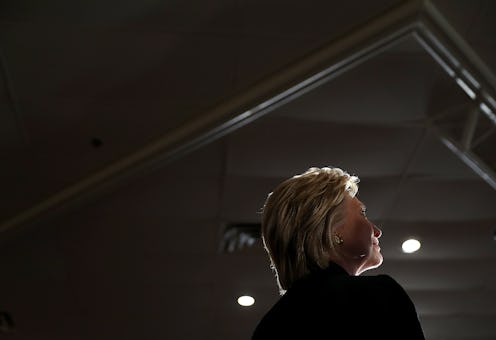News
The Symbolic Nature Of Hillary Clinton's Campaign
Whether you're with her or not, Hillary Clinton is making history. After obtaining the minimum number of delegates needed to secure the Democratic nomination Monday, Clinton has become the first woman to be presumptively nominated as a presidential candidate by a major political party, the Associated Press reported. No woman has come as close to being elected the first female president of the United States as she has, making her an undeniable pioneer. Whether you're a critic or a supporter, the historic significance of Clinton's campaign and what it means for women should not be underestimated.
There is still a small chance that Bernie Sanders could be the Democratic nominee, but it is unlikely.
America now sits on the cusp of history. Thanks to Clinton, a female president is a real possibility now more than ever before. However you feel about Clinton, the historic nature of her campaign is undeniable. If we take a step back from partisan political bickering to appreciate the impact of Clinton's campaign, it's easy to see her bids for the presidency as the first substantial challenge to the male grip on the highest office in the land. Men have held America's top executive office for 227 years. That's more than two centuries.
Some of Clinton's critics argue they're happy to welcome a woman into the Oval Office, just not this one. And certainly, no one should vote for a candidate simply because they feel their gender obligates them. But if not now, when? In another 227 years? Although many tout America as a model of gender equality, women still remain underrepresented in the political arena. In 2015, women held just 104 seats of the 535 available in Congress, meaning women make up just 19.4 percent of Congress despite totaling half of the nation's population.
While Clinton has appeared more willing to frame herself as a history-making candidate in this election, she has rarely rested her laurels on the symbolic nature of her campaign. "I've really kind of matured in my understanding of how symbolism can be efficacious, so I'm more embracing of that," she told New York. "But at the end of the day, being the first woman president can only take you so far. What have I done that can actually produce positive results in somebody's life? Do we have more jobs? Are people's incomes going up? Have we made progress on the minimum wage? What have we gotten done on equal pay? What are we doing on early childhood? I'm still a results-oriented kind of person because that's what I think matters to people."
However, the historic significance of Clinton's campaign isn't limited to her gender. Women's issues have played a key part in Clinton's campaign this go-around, with the former Secretary of State affecting some serious change on American politics by pushing for greater inclusion of women and women's issues. In framing of issues integral to the lives of women as concerns for the wider electorate, in pushing women's issues like equal rights, equal pay, family leave, abortion access, and affordable access to child care as human rights, Clinton is seeking to not only raise awareness for women's rights but to highlight them as human rights.
No matter where you fall on her policies or how you plan to vote come November, the historical significance of Clinton's 2016 presidential campaign is undeniable. Whether she becomes America's first female president or not, Clinton's campaign has irrevocably blazed new trails for women.
